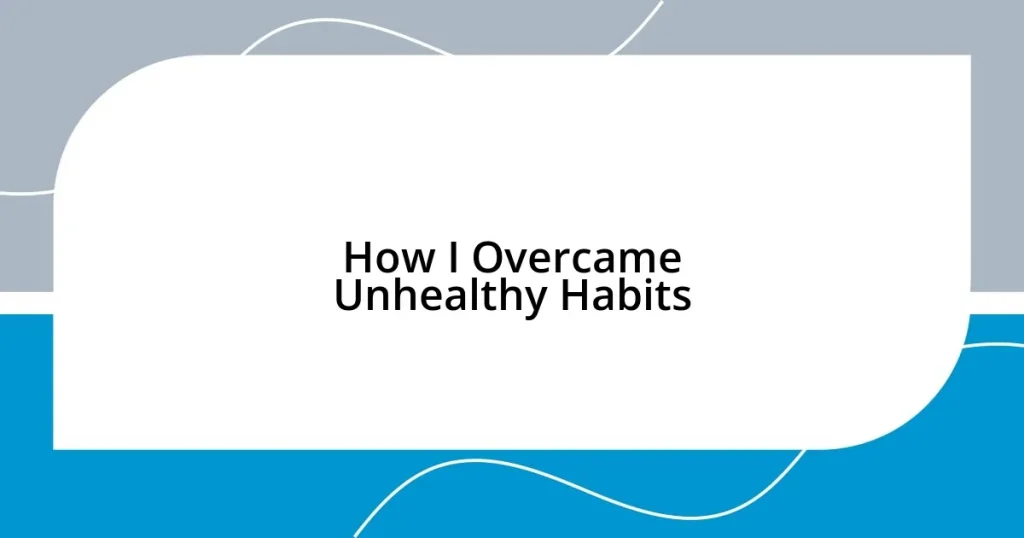Key takeaways:
- Identifying and understanding triggers for unhealthy habits is crucial for making conscious choices and breaking old patterns.
- Setting realistic, specific health goals and celebrating small victories can lead to sustained motivation and progress.
- Developing a support system and communicating your journey with others fosters accountability and encouragement.
- Regularly tracking progress and being willing to adjust strategies helps maintain enthusiasm and address emotional triggers.
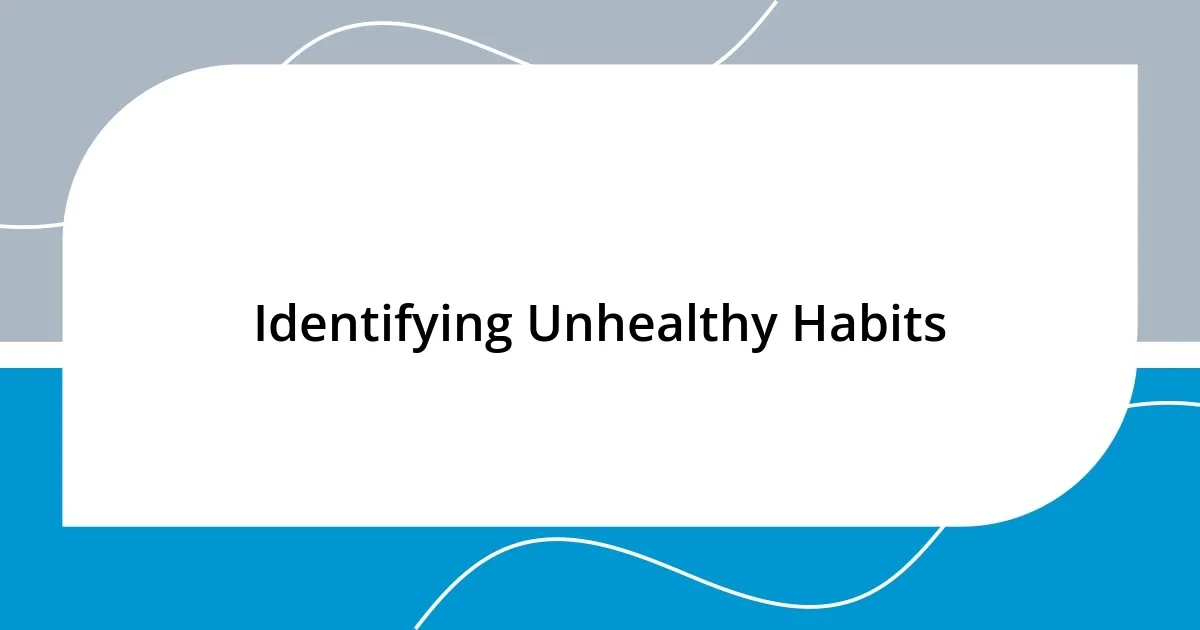
Identifying Unhealthy Habits
Identifying unhealthy habits can sometimes feel like peeling back layers of an onion. I remember a time when I would mindlessly snack while binge-watching my favorite shows, barely even aware of how it affected my health. It made me wonder—how often are we on autopilot with our choices, neglecting the impact they have on our well-being?
As I took a step back, I realized that my drinking habits were also a culprit. Social events often led to a few too many drinks, and it wasn’t until a friend pointed it out that I felt the sting of reality. Have you ever had that moment where someone’s observation makes you see your habits in a new light?
Keeping a daily journal helped me track my behaviors, revealing patterns that were uncomfortable to confront. Seeing it all laid out really changed my perspective—sometimes, just being aware of what we do can lead to a deeper understanding of why we do it. It makes me reflect: are we truly in control, or are we allowing our habits to dictate our lives?
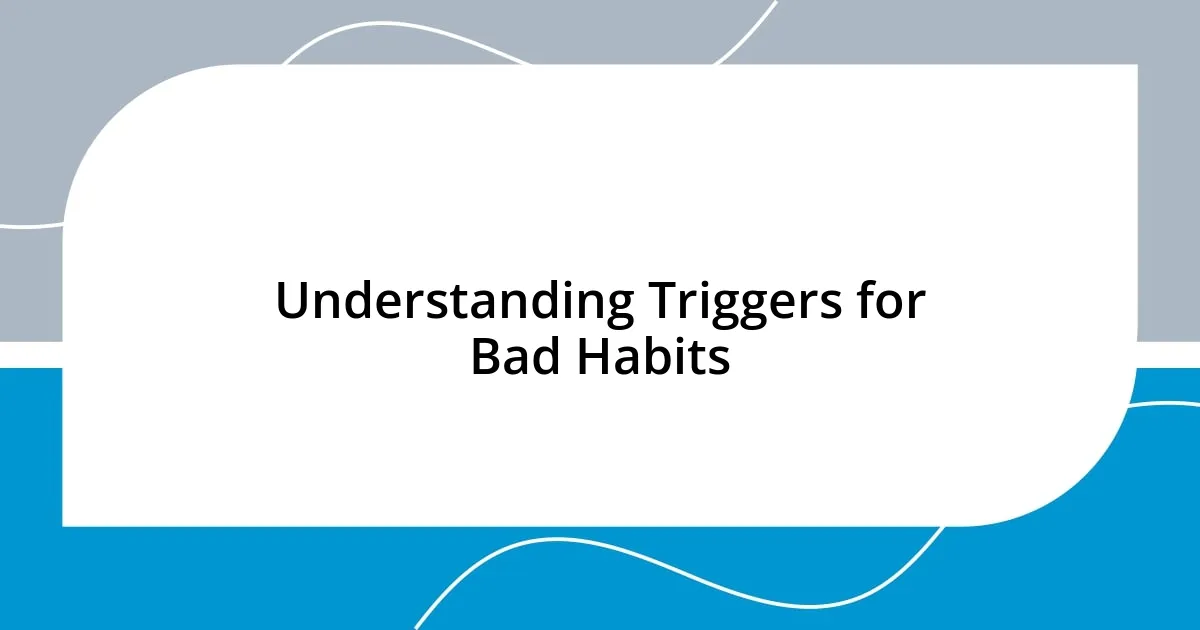
Understanding Triggers for Bad Habits
Understanding what triggers bad habits can truly illuminate our paths toward healthier choices. I vividly recall how certain environments were like invitations to indulge in old patterns. For instance, every time I visited my parents’ house, I would automatically reach for the cookies they kept in the pantry, even if I wasn’t particularly hungry. This realization sparked a crucial question—what specific situations were steering me toward these habits?
Here are some common triggers that can lead to unhealthy behaviors:
- Emotional States: Stress, sadness, and boredom often drove my cravings for comfort foods.
- Social Settings: I found that being around friends led to more impulsive drinking and unhealthy snacking.
- Environmental Cues: Visiting places with familiar temptations reinforced my old habits and made resistance feel impossible.
- Routine and Rituals: Certain times of the day, like late nights, were linked to my urge to binge-watch and snack.
Recognizing these triggers offered me clearer insights into why I slipped back into unhealthy behaviors so easily. By understanding and confronting them, I felt more empowered to make conscious choices instead of letting my surroundings dictate my actions.

Setting Realistic Health Goals
Setting realistic health goals was a game changer for me. When I first started to make changes, I went big—aiming for drastic fitness and diet shifts in a short time. I quickly learned that setting overly ambitious goals only led to burnout and frustration. Instead, I found that starting small made a huge difference. I focused on one habit at a time, like drinking more water instead of soda. Gradually, this led me to integrate more good habits without feeling overwhelmed. Have you ever found that taking baby steps can feel more manageable?
I remember the first time I decided to walk for just ten minutes each day. At first, it didn’t seem like much, but it blossomed into a commitment that improved my mood and energy. Each walk was an opportunity not only for physical movement but also for reflection. I’d often ponder my progress, and as I tracked my steps, I felt a sense of accomplishment—no matter how small they were. Isn’t it amazing how celebrating tiny victories can motivate us to keep going?
When it comes to setting health goals, specificity is key. Rather than saying, “I want to be healthier,” I started framing my goals more concretely—like, “I will eat at least two servings of vegetables per day.” This shift not only clarified my intentions but also held me accountable. I learned that when my goals are measurable and realistic, I’m more inclined to achieve them. What about you? Have you thought about how precise goals might affect your journey?
| Goal Type | Description |
|---|---|
| Ambitious Goals | Big, overarching goals that can feel daunting. |
| Incremental Goals | Small, achievable steps that lead to larger changes over time. |
| Specific Goals | Clearly defined objectives that provide direction. |
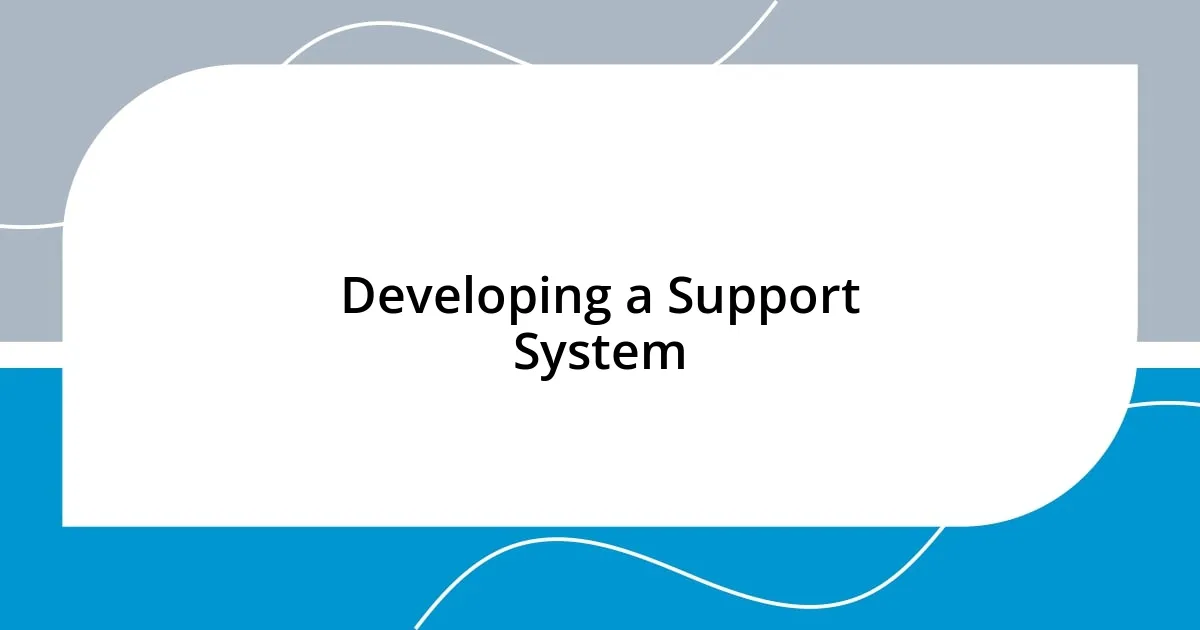
Developing a Support System
Building a support system was absolutely vital in my journey to overcome unhealthy habits. I realized early on that sharing my goals with friends and family created a sense of accountability I desperately needed. One of my closest friends became my workout buddy, and we would message each other to check in on our progress, which made a world of difference. Have you ever noticed how just knowing someone is in your corner can motivate you to stay committed?
In my experience, connecting with others who shared similar goals opened doors to valuable insights and encouragement. I joined a local wellness group where we would share our struggles and successes, and I found that being surrounded by like-minded individuals created an uplifting environment. On tough days, hearing someone else’s story often inspired me to push through. It’s remarkable how shared experiences can drive you forward, isn’t it?
Sometimes, it’s not just about finding a group; it’s also about creating space for open conversations. I made a point to communicate my journey with my family because I wanted them to understand my choices—like skipping dessert or opting for a healthy snack. This transparency not only strengthened our bond but also helped them become supportive allies instead of unintentional saboteurs. Have you thought about how powerful communication can be in building your own support network?
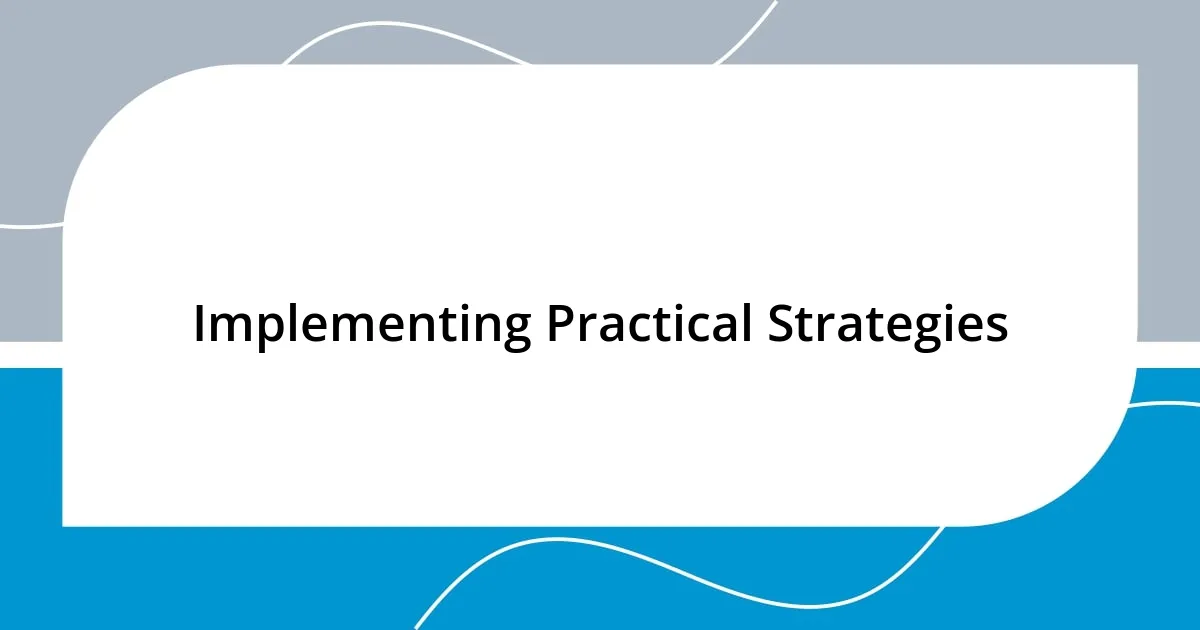
Implementing Practical Strategies
Implementing practical strategies was fundamental for me in overcoming my unhealthy habits. I remember designating specific times during my week just for meal prep. At first, it felt like an extra chore, but as I built this into my routine, I found that having healthy meals ready made it so much easier to resist temptations. Have you ever noticed how preparation can be the key to sticking to your goals?
Incorporating mindfulness was another strategy that transformed my approach to eating. During meals, I practiced being present—savoring each bite and noticing how certain foods made me feel. This practice not only enhanced my appreciation for food but also helped me identify triggers that led to mindless snacking. It got me thinking, how often do we truly pay attention to what we consume?
To keep myself motivated, I also set up a reward system for my achievements. After a week of sticking to my goals, I’d treat myself to a relaxing activity, like a long bath or a favorite movie night. This encouraged me to stay focused, and it made my journey feel less like a sacrifice and more like a rewarding experience. Thinking back, do you celebrate your wins along the way?
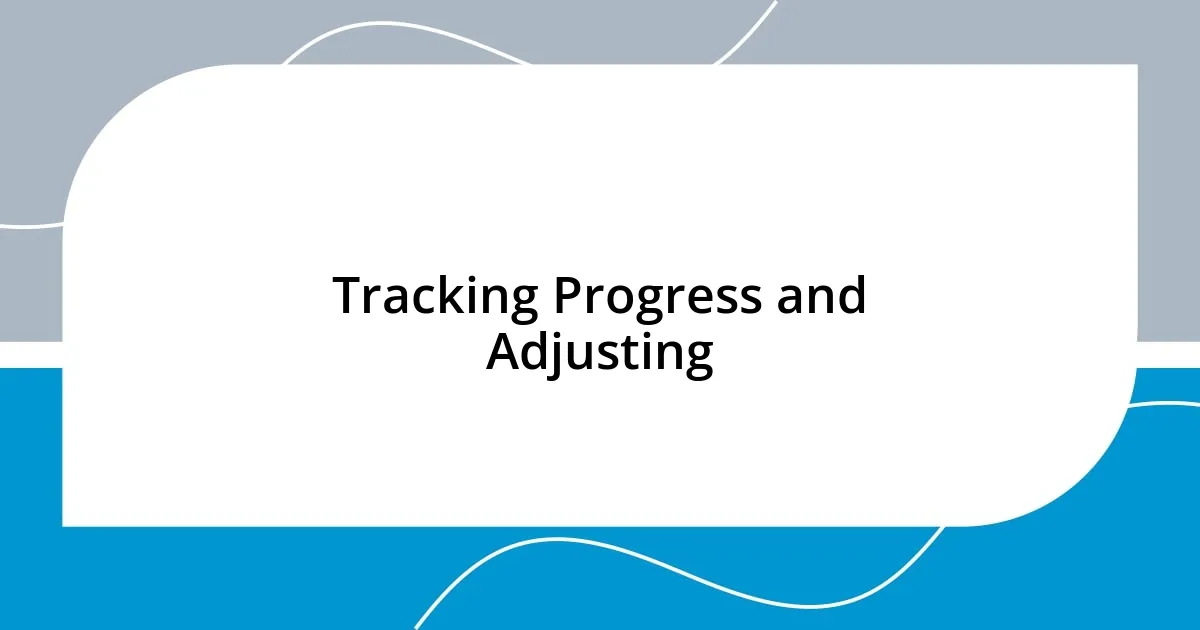
Tracking Progress and Adjusting
Tracking my progress was a game-changer in my journey to overcome unhealthy habits. Every week, I would sit down with my journal and reflect on my successes and setbacks. I’ll never forget that moment when I realized I had gone an entire month without my late-night snacking. It felt incredible to see tangible evidence of my efforts! Have you ever acknowledged how self-reflection can propel you forward?
I also discovered that adjusting my approach was just as important as tracking my success. For instance, when I noticed that a particular workout wasn’t giving me the results I hoped for, I switched to something more engaging, like dance classes. This shift not only reignited my enthusiasm but made fitness feel less like a chore. Isn’t it interesting how sometimes a small tweak can lead to big changes?
The data I gathered through my tracking also allowed me to identify patterns that I wouldn’t have otherwise noticed. By mapping out my mood alongside my eating habits, I came to grips with how emotional eating crept in during stressful periods. Recognizing this connection sparked insights that prompted me to seek healthier coping mechanisms, like journaling or meditation. Do you track your emotional states and behaviors; you might uncover something enlightening!
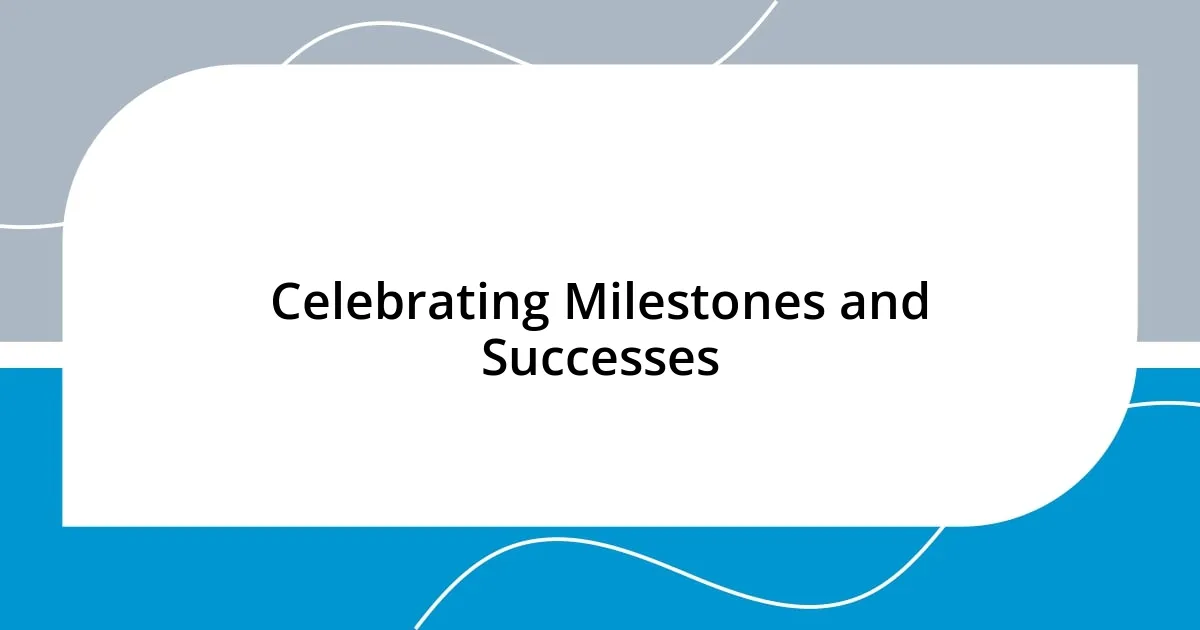
Celebrating Milestones and Successes
When I reached a significant milestone—like hitting three months without sugary snacks—it felt like climbing a mountain and finally reaching the summit. I vividly remember treating myself to a small celebration with friends. Just that moment of acknowledgment was energizing! How rewarding is it to share these victories with those who support your journey?
I’ve learned that celebrating successes doesn’t always have to be grand. Sometimes, even savoring a quiet moment with a warm cup of tea and reflecting on my progress gives me that inner glow. I often think about how such simple acts create meaningful memories in my life. Does that resonate with you, too?
Marking milestones, whether big or small, creates a sense of accountability and reinforces my commitment. Recently, I created a visual timeline on my wall, adding colorful stickers for every milestone I hit. It transforms my goals from abstract concepts into tangible achievements I can see and feel every day. Isn’t it fascinating how visualization can spark motivation and joy in our everyday lives?











